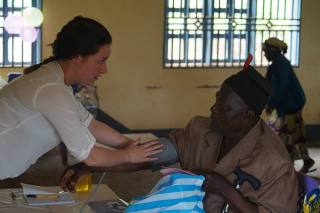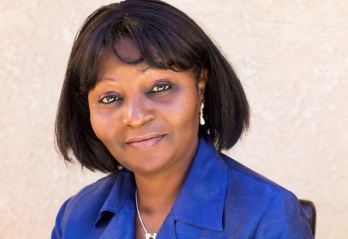Margaret Galabe is a humanitarian, philanthropist, social entrepreneur, advocate for women with disabilities and founder Student International Development Engagement.
SIDE, for short, provides learning programs for international students that are looking to deepen their understanding and gain real, hands-on training and knowledge of the issues that affect vast populations of people living in rural, poverty-stricken villages in Cameroon, Central Africa.
Through Student International Development Engagement mission, sustainable development initiatives are fostered and cross-cultural experiences are available to engage students worldwide through a combination of volunteer opportunities, service learning and internship.
The THE FIRST-EVER BALIGHAM VILLAGE MOBILE HEALTH FAIR book is a story of mothers and their babies, families and the myriad of health concerns facing this underserved remote village.
“It transcends boundaries, North Toledo, in the U.S.A., a diversified group of passionate student volunteers from Canada, the U.S., Ireland, Germany and the Czech Republic” Margaret Galabe explains. “The first-ever Baligham village health fair is as Laura Marano said, and I agree, “Every single person has the power to change the world and help people.” impact the lives of others. Students travel abroad to enrich their global experience, contribute to development issues and find the experience rewarding in a way that they never imagined.”
- How did you decide to pursue a writing career?
“I never thought about being a writer , it grew out of an opportunity I saw to improve the health care and mortality rates of rural families, mothers and children in Baligham, a remote poor village in Cameroon. Using a mobile health fair model, and a team of local and international volunteers planned, executed and assessed the success of the first-ever Baligham Village health fair. The experience of the team is described in this book, including the lessons they learned and the extraordinary gift they shared with members of this underprivileged rural village. The most valuable chapter in the book isn’t about the planning or execution (although they are certainly program priorities) but about the lessons learned. Every successful program must continue to evolve in order to sustain longevity despite the ever changing needs of the project. The goals of this book is to inspire and encourage others to take part in the important work being done via the Baligham Village Project. My experiences are shared in this book for those who will enjoy the encouragement and hope present in a story such as this, where strangers give and share of their time and talent in the service of others.”
- Was getting published hard?
“As you know, writing a book is a long process. THE FIRST-EVER BALIGHAM VILLAGE MOBILE HEALTH FAIR is my first book and I would never have successfully published it without the help of William Hoard, CEO/ Look Press-Seattle, USA. ‘You have developed a most remarkable program to do so much to help the people of Cameroon! I have visited your sites and read thru your preliminary manuscript. I am wondering how you managed this. It seems like such a daunting task, yet an ingenious way to create symbiosis between cultures.– At this point, I am getting a little picky about which projects to take on. My priorities are: 1] books with social or cultural impact (messages that make a difference),— So your project just rose to the top of my list!—'”
- Are your characters based on people you know?
“– one face at a time
“I must admit that I personally measure success in terms of the contributions an individual makes to her or his fellow human beings.”
(Margaret Mead)
Truly, the human aspect of our successes were the most memorable. By that I mean, there are faces we saw on the day of our health fair that I will never forget; they are the faces of people who will stay
in my heart, and in the hearts of volunteers, forever more. And to me, more than a listing of objective evidence that our fair was a success, it was bearing witness to the outpouring of individuals towards their fellow man that was the most compelling reason to say we succeeded.
For example, there is an image of a man who comes to mind as I share this portion of our experience. He was wearing a black hat. Through our health fair, as a routine assessment, he had his blood pressure checked, maybe for the first time ever. Later, he was admitted at the Holy Family Medical Center in Akum and several volunteers and I were able to see him a short time later. He got out of his hospital bed and came out to thank us and to introduce us to his daughter. If we had not screened him at the health fair, he probably would have had a stroke, or worse, died. During examination, Dr. Kume had remarked, “this man can have a stroke at anytime…” and swiftly referred him for further treatment. I don’t think I’ll ever forget this man.”
- What genre is your book?
“As stated in the beginning, one of the goals of this book is to inspire and encourage others to take part in the important work being done via the Baligham Village Project. Genre: anti-poverty, women’s issues and sustainable development.”
- Which of your books is your most favourite?
“THE FIRST-EVER BALIGHAM VILLAGE MOBILE HEALTH FAIR is my first book and my most favorite. A phenomenal success! That’s the overwhelming response to the first ever BALIGHAM MOBILE HEALT H FAIR!
The pilot project was created to provide health care and disease prevention to Baligham, a small village in Cameroon. Sponsored by the Student International Development Engagement, a program in which international students deepen their understanding of the issues facing poor villages in Cameroon. But, it truly does take a village to make this mobile health fair happen. Without the many generous and hard-working volunteers, neither the resulting success nor the Health Fair would have been possible. Volunteers have been and will continue to be the heart of this very worthwhile event…”
- Do you have a specific writing routine?
“Well, at this stage of writing my first book THE FIRST-EVER BALIGHAM VILLAGE MOBILE HEALTH FAIR, a specific routine that worked for me was carrying with me at all times a notebook of the Baligham village mobile health fair actual event, late at night I read my notes and write down any new ideas. I tend to write in the morning after a short walk and a cup of coffee.”
- What are your current projects?
“THE FIRST-EVER BALIGHAM VILLAGE MOBILE HEALTH FAIR, second edition made up of short stories, memories written by different authors into these people’s everyday lives, and calls for action on their behalf.”
- What’s next for you?
“I feel strongly that my long-term vision is on point. That is, in the long-term, I will continue replicating our sustainable model for effective rural healthcare delivery, thereby reducing maternal and child mortality rates among other benefits. I will do so by continuing to use a platform that incorporates university students and faculty – sustainable village development partnerships, service learning and volunteering. In the future, I hope to set up a permanent Maternity Center that would be run by local health care workers partnering with University medical schools combined with a student volunteering and service learning component. I am confident this promising model will not only reduce mortality rates but will also improve the delivery of preventive and primary health care for the people of Baligham Village.”
AUTHOR BIO
Margaret Galabe began her life-changing work as a volunteer and philanthropist at a young age. Watching her mother, a community development officer in Cameroon, work with volunteers from various countries in North America and Western Europe on social and community development projects, inspired Margaret to champion her own projects later in life. She is a committed and tireless advocate for humanitarian, sustainable change and has spearheaded numerous grassroots projects benefitting the economic empowerment of women and the development of rural development projects.
Margaret was nominated in 2003 for the inaugural Perdita Huston Human Rights Award, an award bestowed by the United Nations Association of the United States of America (UNA-USA). She was the 2011 recipient of the International Alliance for Women’s “World of Difference 100” award, an award which recognizes extraordinary individuals whose efforts have contributed to the economic advancement of women locally, regionally or worldwide. She is also a 2009 recipient of the European Union Women Inventors and Innovators special recognition award, and a 2004 recipient of the Global Women Inventors and Innovators (GWIIN) award for expanding export market opportunities for women in developing countries.
LINKS
Amazon Author Page: http://www.amazon.com/author/margaretgalabe
www.studentinternationaldevelopmentengagement.com
http://www.facebook.com/studentinternationaldevelopmentengagement
http://twitter.com/StudentInDev
http://www.pinterest.com/Studentinterdev/




